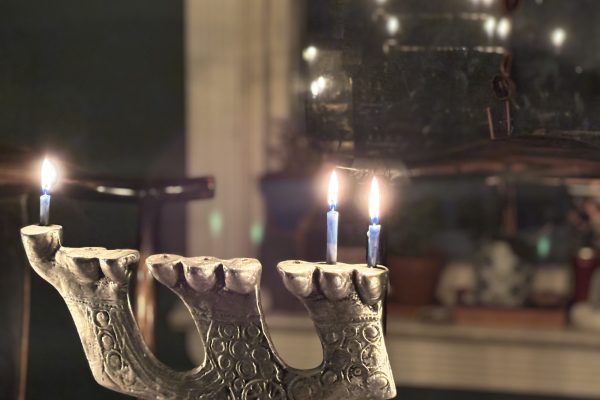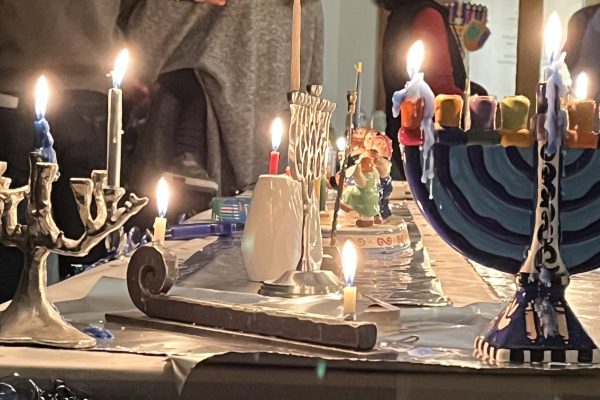Hanerot Halalu:
The prayer Hanerot Halalu, found in the Talmud Soferim 20:6, is recited as the hanukkiyah candles are being lit.
הַנֵּרוֹת הַלָּלוּ אֲנַחְנוּ מַדְלִיקִין עַל הַנִּסִּים וְעַל הַנִּפְלָאוֹת וְעַל הַתְּשׁוּעוֹת וְעַל הַנֶּחָמוֹת שֶׁעָשִׂית לְאִמוֹתֵינוּ וְלַאֲבוֹתֵינוּ
בַּיַּמִּים הָהֵם בַּזְּמָן הַזֶּה עַל יְדֵי כֹּהֲנָיִךְ הַקְּדוֹשִׁים
וּבְכֹל דּוֹרוֹת עַמֵּךְ עַל יְדֵי כָּל אֵלֶּה שֶׁהִדְלִיקוּ נֵרוֹת הַשְׁאָרָה תִּקְוָה וְשָׁלוֹם
וְכָל שְׁמוֹנַת יְמֵי חֲנֻכָּה הַנֵּרוֹת הַלָּלוּ קֹדֶשׁ הֵם וְאֵין לָנוּ רְשׁוּת לְהִשְׁתַּמֵּשׁ בָּהֶם אֵלָא לִרְאוֹתָם בִּלְבַד כְּדַי לְהוֹדוֹת וּלְהַלֵּל לִשְׁמֵךְ הַגָּדוֹל עַל נִסַּיִךְ וְעַל נִפְלְאֹתָיִךְ וְעַל יְשׁוּעָתֵךְ
Hanerot halalu anakhnu madlikin al hanisim ve’al hanifla’ot v’al hateshu’ot v’al hanekhamot she’asit le’imoteynu v’la’avoteynu
Bayamim hahem bazman hazeh al yedey kohanayih hakedoshim
Uv’hol dorot amekh al yedey kol eleh shehidliku nerot hasha’rah tikvah v’shalom.
V’hol shmonat yemey Hanukkah hanerot halalu kodesh hem v’ein lanu reshut
lehishtamesh bahem elah lirotam bilvad kedey lehodot u’lhalel lishmekh hagadol al nisayikh ve’al nifle’otayikh ve’al yeshuatekh.
These lights we kindle for the miracles and the wonders and the salvations and the victories that You performed for our ancestors.
In their day at this season, through Your holy priests.
And in every generation of Your people, through all who kindled lights of inspiration, hope, and peace.
All eight days of Hanukkah, these candles are holy. We are not permitted to use their light, but only to look at them and to appreciate and to praise Your great name for Your miracles, Your wonders, and Your salvations.
Miracles and wonders…of salvations and of victories:
This section refers to the many aspects of Jewish history and legend that we acknowledge at Hanukkah. Some recent versions of this prayer express thanks for nekhamot (comfort) in lieu of milkhamot (wars or victories) because of its more peaceful message. If we choose to acknowledge our military victories, let us consciously commemorate those of both the Macabbees and the less well-known heroine, Judith.
performed for our ancestors:
In Hebrew, the word imoteynu (mothers) is added alongside the word avoteynu (fathers), thereby including all of our ancestors.
and in every generation…and peace:
Traditionally, this prayer highlights only two types of role models: military victors, such as the Macabbees and Judith, and high priests, who were involved in the miracle of the oil in the Temple. Kolot’s version of the prayer adds, “all who kindled lights of inspiration, hope, and peace” in order to expand the range of role models and miracle-makers from our past.
As we light candles to celebrate the sacredness of light and the mystery of darkness, we experience a moment of infinite possibility that has been shared by Jewish women and men of every generation.
Traditional Hanukkah Blessings
Addressing God with masculine pronouns.
It is customary to recite these blessings before lighting the candles:
בָּרוּךְ אַתָּה אֲדֹנָי אֱלֹהֵינוּ מֶלֶךְ הָעוֹלָם אֲשֶׁר קִדְּשָׁנוּ בְּמִצְוֹתָיו וְצִוָּנוּ לְהַדְלִיק נֵר שֶׁל חֲנֻכָּה
Barukh atah adonay eloheynu melekh ha’olam asher kideshanu b’mitzvotav v’tzivanu l’hadlik ner shel Hanukkah.
Blessed are you, Lord our God, King of the Universe, who makes us holy through your commandments and commands us to light the Hanukkah candles.
בָּרוּךְ אַתָּה אֲדֹנָי אֱלֹהֵינוּ מֶלֶךְ הָעוֹלָם שֶׁעָשָׂה נִסִּים לַאֲבוֹתֵינוּ בַּיָּמִים הָהֵם בַּזְּמָן הַזֶּה
Barukh atah adonay eloheynu melekh ha’olam she’asah nisim la’avoteynu bayamim ha’hem bazman ha’zeh.
Blessed are you, Lord our God, King of the Universe, who performed miracles for our forefathers in their day at this season.
First night only:
בָּרוּךְ אַתָּה אֲדֹנָי אֱלֹהֵינוּ מֶלֶךְ הָעוֹלָם, שֶׁהֶחֱיָנוּ וְקִיְּמָנוּ וְהִגִּיעָנוּ לַזְּמָן הַזֶּה
Barukh atah adonay eloheynu melekh ha’olam shehekheyanu vekiyemanu vehigi’yanu lazman hazeh.
Blessed are you, Lord our God, King of the Universe, who keeps us alive, sustains us, and brings us to this moment.
Kolot’s Hanukkah Blessings
Because Hebrew is a gendered language, God must be addressed and referred to using masculine or feminine pronouns. Traditionally, all texts in Hebrew (the language of Jewish prayer) use masculine language, whether talking about the God of Israel as creator, liberator, or nursing mother. Above, we offered you the traditional blessings, which address God with masculine pronouns and corresponding verbs. Below, we offer you the same blessings, replacing melekh ha’olam (King of the universe) with mekor ha’hayyim (Source of Life). We address God as “you” (feminine) and change the verbs accordingly.
We invite you to recite the Hanukkah blessings on at least one night this year using the feminine pronouns for God.
Does your sense of the Divine shift?
It is customary to recite these blessings before lighting the candles:
בְּרוּכָה אַתְּ יָהּ מְקוֹר הַחַיִּים אֲשֶׁר קִדַשְׁתַנוּ בְּמִצְוֹתֵיהָ וְצִוְתָנוּ לְהַדְלִיק נֵר שֶׁל חֲנֻכָּה
Berukhah at yah mekor ha’hayyim asher kideshatnu be’mitzvoteyha v’tzivatnu l’hadlik ner shel Hanukkah.
Praised are You God, Source of Life, who makes us holy through your commandments and commands us to light the Hanukkah candles.
בְּרוּכָה אַתְּ יָהּ מְקוֹר הַחַיִּים שֶׁעָשְׂתָה נִסִּים לְאִמוֹתֵינוּ וְלַאֲבוֹתֵינוּ בַּיָּמִים הָהֵם בַּזְּמָן הַזֶּה
Berukhah at yah mekor ha’hayyim she’astah nisim l’imoteynu v’la’avoteynu bayamim ha’hem ba’zman ha’zeh.
Praised are You God, Source of Life, who performed miracles for our ancestors in their day at this season.
First night only:
בְּרוּכָה אַתְּ יָהּ אֱלֹהֵינוּ רוּחַ הָעוֹלָם שֶׁהֶחֱיָתְנוּ וְקִיְּמָתְנוּ וְהִגִּיעָתְנוּ לַזְּמָן הַזֶּה
Berukhah at yah mekor ha’hayyim shehekheyatnu vekiyematnu vehigi’atnu la’zman ha’zeh.
Praised are You God, Source of Life, who keeps us alive, sustains us, and brings us to this moment.











